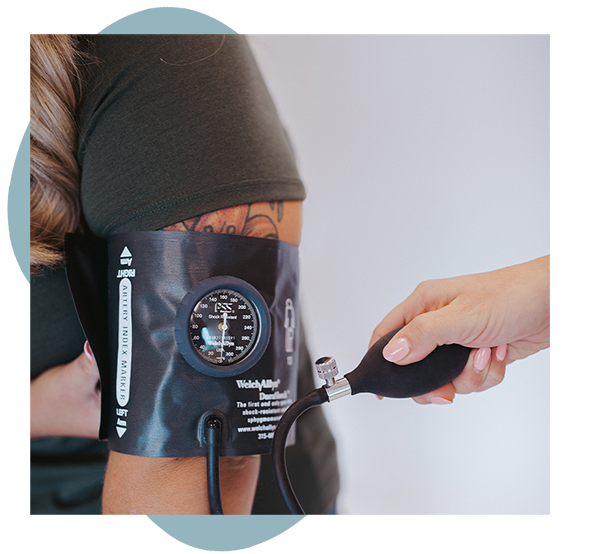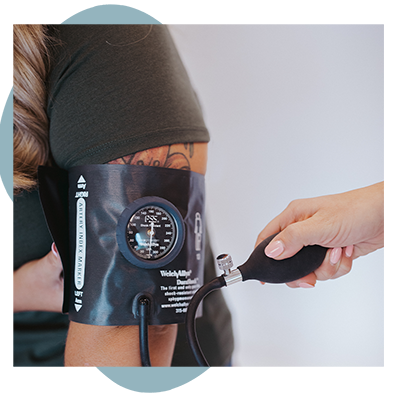
Weight Loss Surgery.
Weight loss surgery in Metro Atlanta.

About weight loss surgery.
Weight loss surgery is a tool that, in a comprehensive weight management plan, allows the patient to have long-term success in losing weight and maintaining that weight loss. However, weight loss surgery is not for everyone. It works best for those who have seriously committed to the long-term lifestyle change necessary to make the surgery successful. Regular life-long follow-up is necessary to achieve the best results and minimize complications.
Our weight loss surgery procedures.
We perform all weight loss surgery procedures using a robotic or minimally invasive approach.
Gastric Sleeve
The gastric sleeve surgery, otherwise known as the vertical sleeve gastrectomy, is a popular procedure due to its effectiveness and perceived simplicity. It consists of removing a large portion of the stomach to limit the patient’s food intake, resulting in weight loss. Although the gastric sleeve is a non-reversible procedure, it can be revised to a gastric bypass if needed.
- Learn More
Duodenal Switch
The duodenal switch, also known as the biliopancreatic diversion with duodenal switch or DS for short, is less commonly performed procedure. Most bariatric surgeons will typically recommend the duodenal switch procedure for our heavier patients. The duodenal switch weight loss surgery is a combination of the gastric sleeve and gastric bypass. Therefore, this procedure is non-reversible.
- Learn More
More than just surgery.
Bariatric Surgery is a life-altering event that can ultimately lead to a happier you. However, surgery is just one tool that will help you achieve your goal weight. Your weight loss story is a life-long journey that does not simply start and stop with surgery—but instead is a mix of proper nutrition, physical activity, vitamins and supplements, the appropriate after-care, and so much more.

Increased energy

Longer Life

Better Health

Lower Medical Costs

More Happiness

More than just surgery.
Bariatric Surgery is a life-altering event that can ultimately lead to a happier you. However, surgery is just one tool that will help you achieve your goal weight. Your weight loss story is a life-long journey that does not simply start and stop with surgery—but instead is a mix of proper nutrition, physical activity, vitamins and supplements, the appropriate after-care, and so much more.
- Increased Energy
- Longer Life
- Better Health
- Lower Medical Costs
- More Happiness

Results that change lives.
Bariatric surgery is a life altering event that leads to improved health and quality of life.
Risks of weight loss surgery.
Before considering bariatric surgery, it is important to be familiar with the potential risks. Risks vary based on the type of bariatric procedure performed and the health of the patient.

Minor complications that are uncommon and can be managed fairly easily:
· Minor wound or skin infection
· Loose/excess skinVomiting or nausea
· Acid reflux (heartburn)
· Changes in bowel habits like diarrhea, bloating, cramping, or gas
· Development of gallstones or gallbladder disease
· Nutritional deficiencies
Major complications that could result in re-operation:
· Internal bleeding
· Intestinal obstruction
· Blood clots in the legs or lungs
· Internal Hernia
· Perforation of stomach/intestines or leakage

Minor complications that are uncommon and can be managed fairly easily:
· Minor wound or skin infection
· Loose/excess skinVomiting or nausea
· Acid reflux (heartburn)
· Changes in bowel habits like diarrhea, bloating, cramping, or gas
· Development of gallstones or gallbladder disease
· Nutritional deficiencies
Major complications that could result in re-operation:
· Internal bleeding
· Intestinal obstruction
· Blood clots in the legs or lungs
· Internal Hernia
· Perforation of stomach/intestines or leakage
Pathway to weight loss surgery.
1. Request a consult
We encourage all bariatric patients to research their options prior to getting started. Once you are ready to start your weight loss journey, you can fill out a form on our website or call our office.
3. Initial consult
At your initial consultation, you will get a chance to meet one-on-one with your surgeon to discuss your questions, concerns, and desired procedure. During the initial visit, which will last about 2 hours, you will also meet your patient navigator, who will discuss in detail the pre-surgical requirements, diagnostic testing, and surgery scheduling.
5. Mid Program Check in
Midway through your journey to weight loss surgery, we will check in with you to make sure you are on track with your pre-surgical requirements and answer any questions you may have about next steps.
7. Diagnostic testing
Before surgery, you will be required to undergo diagnostic tests such as an EGD and a pulmonary clearance. We may also require you to have blood work drawn, or other tests performed to obtain medical or cardiac clearance. If you need medical clearances, your patient navigator will notify you and will assist in providing a referral for these clearances.
9. Surgery
Once you have completed your required evaluations, all of your clearances, and your pre-op diet, you are now ready for surgery! However, the journey does not stop here. Weight loss surgery is a lifelong journey with continued effort.
2. Insurance verification
After you request your initial appointment, we will collect your insurance information and call your insurance company to find out more about your benefits. We will also go ahead and schedule you for an initial consultation.
4. Nutrition and Exercise Evaluations
During the length of your program, whether 3 or 6 months, you will attend 3 nutrition evaluations with the dietitian and a physical therapy session with a kinesiologist once a month. The purpose of these evaluations are to educate you on how to live healthy through diet and exercise after weight loss surgery.
6. Psychological evaluation
We require all patients to obtain a psychological clearance for bariatric surgery. The purpose of this step is to make sure you are ready to make a change in regards to your weight because surgery is not a quick fix, but requires a lifetime commitment. During this process, you will meet with a bariatric psychologist to discuss your history of weight gain and previous efforts to lose weight.
8. Pre-op diet
Certain insurance providers will require patients to perform a 6-month, 3-month, or 6-week diet before surgery. If this is needed, our dietitian will assist in helping you get started. You will also be required to do a 2-week pre-op liquid diet. The purpose of the pre-op diet is to shrink the size of the liver for a safer and easier operation
1. Request a consult
We encourage all bariatric patients to research their options prior to getting started. Once you are ready to start your weight loss journey, you can fill out a form on our website or call our office.
2. Insurance verification
After you request your initial appointment, we will collect your insurance information and call your insurance company to find out more about your benefits. We will also go ahead and schedule you for an initial consultation.
3. Initial consult
At your initial consultation, you will get a chance to meet one-on-one with your surgeon to discuss your questions, concerns, and desired procedure. During the initial visit, which will last about 2 hours, you will also meet your patient navigator, who will discuss in detail the pre-surgical requirements, diagnostic testing, and surgery scheduling.
4. Nutrition and Exercise Evaluations
During the length of your program, whether 3 or 6 months, you will attend 3 nutrition evaluations with the dietitian and a physical therapy session with a kinesiologist once a month. The purpose of these evaluations are to educate you on how to live healthy through diet and exercise after weight loss surgery.
5. Mid Program Check in
Midway through your journey to weight loss surgery, we will check in with you to make sure you are on track with your pre-surgical requirements and answer any questions you may have about next steps.
6. Psychological evaluation
We require all patients to obtain a psychological clearance for bariatric surgery. The purpose of this step is to make sure you are ready to make a change in regards to your weight because surgery is not a quick fix, but requires a lifetime commitment. During this process, you will meet with a bariatric psychologist to discuss your history of weight gain and previous efforts to lose weight.
7. Diagnostic testing
Before surgery, you will be required to undergo diagnostic tests such as an EGD and a pulmonary clearance. We may also require you to have blood work drawn, or other tests performed to obtain medical or cardiac clearance. If you need medical clearances, your patient navigator will notify you and will assist in providing a referral for these clearances.
8. Pre-op diet
Certain insurance providers will require patients to perform a 6-month, 3-month, or 6-week diet before surgery. If this is needed, our dietitian will assist in helping you get started. You will also be required to do a 2-week pre-op liquid diet. The purpose of the pre-op diet is to shrink the size of the liver for a safer and easier operation
9. Surgery
Once you have completed your required evaluations, all of your clearances, and your pre-op diet, you are now ready for surgery! However, the journey does not stop here. Weight loss surgery is a lifelong journey with continued effort.
Ready to transform your life?
You’ve come to the right place. Schedule your bariatric consultation and get started on your weight loss journey.
